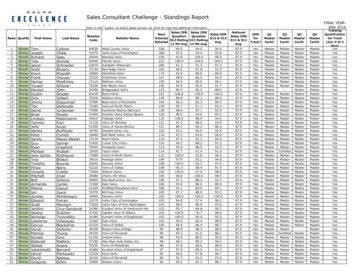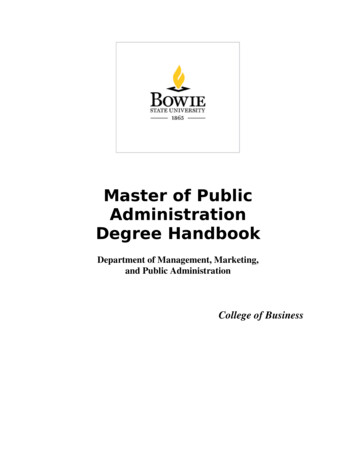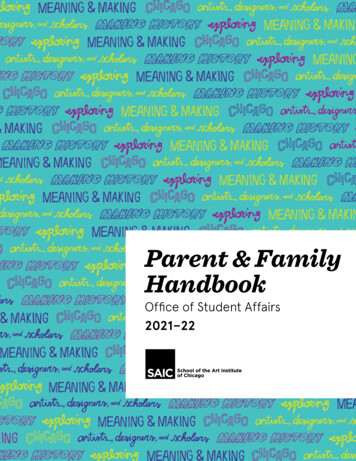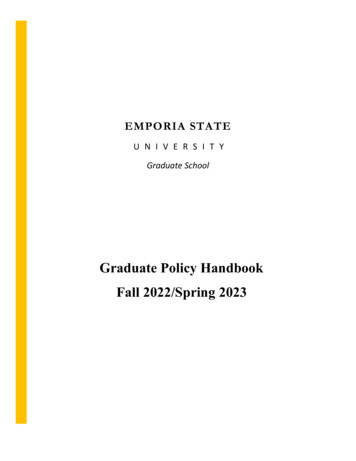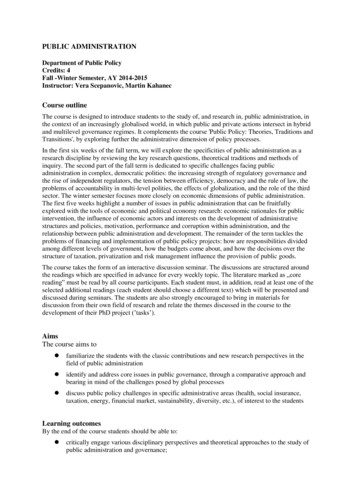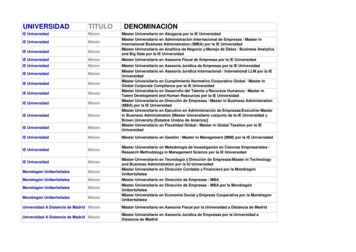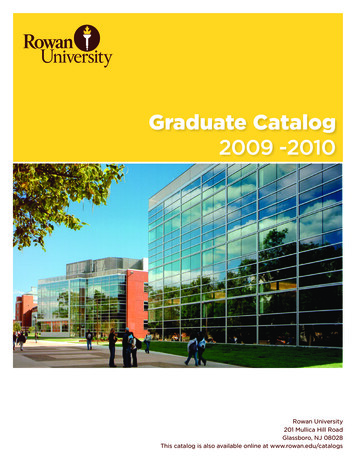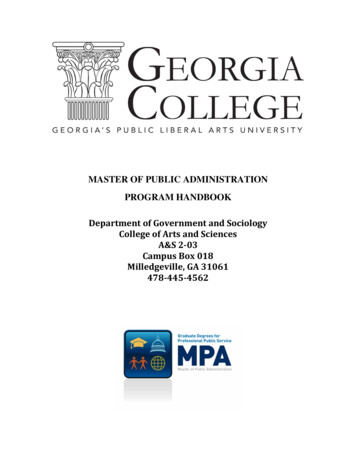
Transcription
MASTER OF PUBLIC ADMINISTRATIONPROGRAM HANDBOOKDepartment of Government and SociologyCollege of Arts and SciencesA&S 2‐03Campus Box 018Milledgeville, GA 31061478‐445‐4562
CONTENTSPreface3NASPAA Accreditation Statement4Program OverviewMissionProgram GoalsStudent Learning OutcomesFacultyMPA CurriculumDegree RequirementsCore CoursesElective CoursesIndependent ResearchCompletion OptionsAdmission, Progression, and GraduationAdmissionApplication DeadlinesAdmission StatusHealth nResourcesLocation of ClassesD2L Learning Management SystemWriting Center ResourceGraduate Library ServicesGALILEO Digital LibraryEndNote /Personal Bibliographic SoftwareTurnitinTechnology 91919192
PREFACEThe MPA Handbook is produced once each academic year to provide details onprogram requirements and expectations. The handbook addresses importantinformation necessary for the successful pursuit of the MPA degree.Please note that the curriculum requirements provided in the edition of thishandbook apply to all students admitted as of the Fall semester 2014. This MPAHandbook should be used in conjunction with the GCSU Graduate Catalog, availableat http://catalog.gcsu.edu, which describes policies and procedures for graduatestudy at Georgia College and State University. ApplicableGCSU policies are incorporated in this handbook by reference.No handbook or website can answer all students’ questions, and certainly cannotreplace contact with the faculty advisors who are ready, able, and willing to provideassistance in dealing with the MPA program and its requirements. Your assignedfaculty advisor is always your best source for information.The College of Arts and Sciences reserves the right to make changes in its policiesand procedures, and other information in the handbook as deemed appropriate andnecessary. All changes will be communicated promptly to students, faculty, and staff.The handbook is prepared and revised annually for the use of administrators,faculty, students, and staff. Suggestions regarding clarification or addition of topicsare welcome. For questions, please contact the MPA program at 478.445.0938 or viaemail at michele.williams@gcsu.edu.3
NETWORK OF SCHOOLS OF PUBLIC POLICY, AFFAIRS, &ADMINISTRATION (NASPAA)Georgia College and State University’s Master of Public Administration program hasreceived national acclaim for its design and content. The program is accredited withthe Network of Schools of Public Policy, Affairs, and Administration (NASPAA).NASPAA is an institutional membership organization that exists to promoteexcellence in public service education. NASPAA is a specialized accrediting bodyrecognized by the Commission on Recognition of Post‐secondary Accreditation toaccredit master’s level degree programs in public policy, public affairs, and publicadministration. The membership includes more than 166 accredited programs.NASPAA serves as the national center for information about educational programsand developments in public affairs and administration. Further, NASPAA representsthe concerns and interests of its member institutions in national policy on publicadministration education and research. NASPAA accomplishes these purposesthrough direct services and by: Representing to government and other institutions the objectives and needsof education for public affairs and administration; Encouraging curriculum development and innovation and providing a forumfor discussion of educational issues; Developing appropriate standards for educational programs and reviewingthe quality of programs against the standards; Undertaking surveys that provide members and the public with informationon key educational issues; Providing a clearinghouse on graduate education for public affairs andadministration in the U.S. and throughout the world; and Providing technical assistance on the design and content of graduateprograms to its members and foreign universities and institutes.Starting in 1991, the MPA program was placed on the National Roster of Programsfound to be in substantial conformity with NASPAA standards. Our MPA programhas been continuously accredited since initial accreditation was attained in theSpring of 1995. The program is currently accredited through 2015‐2016.www.naspaa.org4
PROGRAM OVERVIEWMissionThe MPA program prepares students to ethically and competently serve, manage, andlead in the diverse public sector through teaching, research, and service to thediscipline and broader community.MPA Program GoalsTo accomplish our mission, we seek to: Prepare students for careers in the public sector Promote the diversity of the student body and faculty Cultivate faculty committed to teaching, scholarship, and servicePublic Service ValuesWe seek to: Pursue the public interest with accountability and transparency Serve professionally with competence, efficiency, and objectivity Act ethically Demonstrate respect, equity, and fairnessMPA Student Learning OutcomesStudents will be able to: Demonstrate effective leadership and management skills. Evaluate the political, economic and legal dynamics of the policymakingenvironment and its impact on the work of public administrators. Evaluate the effectiveness of public programs and the outcomes of policyalternatives. Synthesize, analyze, and apply theories and principles of public management. Apply quantitative techniques of analysis in policy and program implementationand evaluation, as well as in decision‐making and problem solving. Compare and contrast the political, structural, and social environment of publicand private management. Communicate and interact productively in an environment of changingdemographics, evolving technology, and diverse perspectives.FacultyBelow is a list of faculty members, along with their specialization area(s). Spirou, Costas, Ph.D., Loyola University Chicago, Urban Affairs &Governance, Chair of Department of Government & Sociology Coate, Roger, Ph.D., The Ohio State University, Non‐Profit Management,International Administration Edmondson, Henry, Ph.D., University of Georgia, Ethics, Administrative Law Kennedy, Brandy, Ph.D., University of Oklahoma, Public Finance &5
Budgeting, Personnel ManagementKim, Min, Ph.D., Arizona State University, Public Financial Management,Quantitative Research Methods, MPA Program CoordinatorWilkinson, Clifton, Jr., MPA, Georgia College & State University, PublicPolicy, State and Local Government, Internship Coordinator6
MPA CURRCULUMThe 36‐credit MPA program is offered in a convenient online format designed forthe busy working professional. The program can be completed in four semesters offull‐time study.Degree RequirementsStudents admitted earlier thanFall 2014For the non thesis optionCore CoursesElective CoursesPUAD 6689 Career AssessmentProject (in‐service student) orInternship (pre‐service student)Total Credit HoursFor the thesis optionCore CoursesElective CoursesThesisTotal Credit HoursCredit Students admitted Fall 2014 and CreditHours beyondHours21150249336Core CoursesElective CoursesPUAD 6700 Capstone Project(for both in‐service and pre‐service student)Total Credit Hours219636Core CoursesElective CoursesThesisTotal Credit Hours246636CreditHours3Students admitted Fall 2014and beyondPUAD 6538Public Administration andPublic ServicePUAD 6558Public Personnel ManagementPUAD 6578Public Finance and BudgetingCreditHours3PUAD 6601Public Policy AnalysisPUAD 6603Leadership and OrganizationalBehaviorPUAD 6605Quantitative Techniques inPublic AdministrationPUAD 6606Research Methods336Core CoursesStudents admitted earlier thanFall 2014PUAD 6538Public Administration and PublicServicePUAD 6558Public Personnel ManagementPUAD 6568Administrative Law for thePublic ManagerPUAD 6578Public Finance and BudgetingPUAD 6601Policy Making, Implementation,and EvaluationPUAD 6605Quantitative Techniques inPublic AdministrationPUAD 6615 AdministrativeEthics or333333333337
PUAD 6625 IntergovernmentalRelationsTotal Credit Hours21PUAD 6615 AdministrativeEthics3Total Credit Hours24Elective CoursesThe purpose of elective courses is to allow students the option to specialize in asubject area of choice according to the student's interest and career goals. Studentsmay choose any PUAD 5000‐6000 level course and any POLS 5000‐6000 levelcourse. Other electives listed below, which are preapproved. Other graduatecourses can be considered for elective credit upon approval of the Coordinator.Course descriptions can be found in the online Graduate Catalog.BCOM 6221BCOM 6222ECON 6176GEOG 5205LOGS 6647LOGS 6650MGMT 6950Communications Theory in ManagementAdvanced Managerial CommunicationManagerial EconomicsPolitical GeographyLogistics Processes and ManagementPurchasing & Materials ManagementOrganization Behavior & CommunicationIndependent ResearchAn independent research course (PUAD 6940) provides the student the opportunityto explore in detail a subject that is not normally covered in regular course offerings.Usually, the subject to be studied is one that was touched on in a regular course, andthe student wants to spend more time and effort investigating the subject.Students who want to take an independent research course should first discuss theirideas with a full‐time MPA faculty member (i.e., anyone who is a regular facultymember of the Department of Government). The student should be prepared toexplain what he wants to study, why he wants to study it, and of what significancethe subject is. As a general rule, only students who are well into the MPA program(i.e., having earned at least 11 graduate PUAD hours), who have performedsatisfactorily in graduate PUAD courses, and who have reached agreement with afull‐time MPA faculty member on the subject to be studied will be allowed toregister for an independent study. Failure to follow the procedure may cause theregistration to be invalidated and will cause the course not to be counted for creditin the MPA degree program. Although the MPA Coordinator's name will be in theschedule book as the instructor for independent studies, any regular MPA facultymember can supervise an independent study. Students should, however, secure theMPA Coordinator's approval before registering for the independent study to makesure the course will fit into the approved program.8
By the end of the second week of the term, the student should submit a prospectus,generally at least one full page, which summarizes the subject to be researched, thesignificance of the subject, the methodology to be used in the research, and a brieflist of works consulted. The supervising faculty member must approve theprospectus before the student proceeds with the research. If there are problemswith the prospectus, it is the student's obligation to correct those problems to theinstructor's satisfaction. Otherwise, the student will be forced to drop the course.Depending on the timing of the drop, the student may receive only a portion(perhaps none) of his fees back for the course.The supervising faculty member may require the student to report on the progressof the research at regular intervals. Usually, a detailed bibliography will be requiredat or around mid‐term. The final paper is due the last week of the term, typically onthe first day of final exams. The paper should be typed in accordance with standardtyping rules (i.e., double‐spaced, one inch margins, fully annotated, exhibits such astables and diagrams on separate pages, title page, sub‐headings, separatebibliography, etc.). Consult a standard Public Administration or Political Sciencejournal for annotation details (e.g., the style used in the Public AdministrationReview would be acceptable). The final paper submitted for a grade should be afinished product. There is no set length for the paper, but most good independentstudy papers will range from 25 to 40 pages of text. Students should understandthat requirements for the independent study course are stringent and grading isrigorous. Students should spend at least as much time on independent researchcourses as on regular courses.Completion OptionsIn addition to degree requirements listed elsewhere, student enrolled in the MPAprogram must complete either a Career Assessment project, Internship or theCapstone Project Course prior to being awarded their degree.Career Assessment Project (CAPs)Students admitted Fall 2014 (and beyond) do not have the option of taking a CareerAssessment Project; instead, they are required to complete a Capstone Project orThesis to graduate.Students classified as in‐service who are not choosing the thesis option will take theCareer Assessment Project, PUAD 6689, as their final course. A separate handout isavailable with details for the CAP. The final product of the CAP is a paper, usually12‐20 pages in length, which evaluates the student's career goals and experiences inlight of the student's graduate program. A session with the Coordinator and/orother MPA faculty discussing the paper is also part of the CAP. The CAP is graded ona pass/fail basis. Many students find it useful as preparation for the CAP to keep alog or a journal that records their impressions about courses and the program ingeneral.9
InternshipStudents admitted Fall 2014 (and beyond) have the option of taking an Internship asan elective course not a completion option. Instead, they are required to complete aCapstone Project or Thesis to graduate.Students who have not had full‐time work experiences in the public sector will beclassified as pre‐service and will need to complete an internship, PUAD 6960 for theMPA degree. The internship is usually taken close to the end of a student's program,often in the very last semester. Students needing the internship should beginplanning for it one or two semester before actually registering for it. TheCoordinator and the Internship Coordinator must be consulted as the first step. TheInternship Coordinator in the Government Department will be very helpful inexploring placement possibilities. Customarily, students in good standing have hadgreat success in securing appropriate internship experiences with a variety of stateand local and some national public agencies, as well as non‐profit agencies.The internship is a full‐time work experience. The intern typically will be assignedduties by the employer that are equivalent to those of entry‐level professionalpersonnel. There will be a written agreement between the University and theemployer as to what those duties and expected learning objectives are. The intern'sprimary task is to perform his job duties well and fully, but there also will be somereports to be turned in to the Coordinator in order to earn the academic credit.Students will be required to keep a journal with regular entries and will be assigneda paper topic drawn from the internship experience. After submission of the journaland paper, there will be a conference between the student and the InternshipCoordinator to discuss the internship experience. Grading is done on a pass‐failbasis. Ordinarily, the student will not be taking any other courses while doing theinternship.Capstone ProjectStudents admitted Fall 2014 (and beyond) are required to complete a CapstoneProject or Thesis to graduate.The Capstone Project, PUAD 6700 offers each student the opportunity todemonstrate mastery of the theory and practice of public administration byapplying the knowledge and skills gained in the MPA program to a project of thestudent’s choice. This involves completing a project report reflecting the cumulativeknowledge gained from these experiences. The course is intended only for studentswho are completing their Masters of Public Administration (MPA). The courseprerequisite is PUAD 6606 (Research Methods) or its equivalent, the completion of27 hours in the MPA program, and Program permission.The project can focus on any of a variety of applied public and nonprofitmanagement issues, but it must address a significant public or nonprofitmanagement concern and incorporate significant file work, observation, or datacollection. It may be developed in conjunction with one or more of the capstone corecourses and must represent an integration of the concerns of public management10
with those of the concentration area. The student will work under the supervision ofthe Capstone Project course instructor and will be expected to work with otherfaculty teaching in their area of focus. Upon completion, the Capstone Project coursewill be read by faculty and presented as a part of a day‐long public servicecolloquium.Students should work with their advisor or another faculty member in developing aproposal for the Capstone Project course, well in advance of the semester in whichthey would like to enroll for the course. Additional information regarding thiscourse is available on the School web site.Thesis OptionStudents contemplating further graduate work or wanting an in‐depth researchexperience should consider the thesis option. The thesis option entails 6 credithours, leaving 30 credit hours of regular courses. The thesis option consists of twoseparate courses followed by a thesis defense. These must be taken in the followingsequence: PUAD 6971 Thesis Research Design ‐‐ The student will prepare a detailedprospectus of the research topic. The prospectus will include a bibliography,a description of methodology to be used, substantive goals to be achieved, arealistic schedule to be followed, and other details deemed necessary by theThesis Supervisor. Student must receive a "satisfactory" (S) grade beforebeing permitted to register for PUAD 6972. PUAD 6972 Thesis Writing and Development ‐‐The student will submitchapters of the thesis to the Thesis Supervisor and Second Reader. Chapterswill be read, evaluated, and revised until final approval as to form andcontent is given. An "S" grade must be earned before the student can move onto PUAD 6973. PUAD 6973 Thesis Defense ‐‐The student will defend the thesis before acommittee composed of the Super‐ visor, Second Reader, and a third facultymember (either from Government/Sociology or another appropriatedepartment). A successful defense completes the degree. Part of this courseis the submission of the final, approved thesis to the GC Library bindingoffice.A student interested in the thesis option should apply to the MPA Coordinator, whowill decide in consultation with other MPA faculty if the option is appropriate for thestudent. The Coordinator will work with the student in choosing a Thesis Supervisorand Second Reader (the Thesis Committee) and in selecting a third faculty memberto participate in the thesis defense.A student approved for the thesis option will register for the first course (PUAD6971) in the thesis sequence at least two semesters before the expected date ofcompletion. After earning a satisfactory grade ("S") in the first course, the studentwill then register for the second course, and so on. Students should not attempt11
more than 6 hours of additional non‐thesis courses each quarter while working onthe thesis. A student may withdraw from the thesis option prior to taking PUAD6972, the second thesis course.The Graduate School office has a style manual for master's theses that must befollowed in the typing of the thesis. Students are encouraged to consult other stylemanuals, such as Kate Turabian's A Manual for Writers of Term Papers, Theses, andDissertations. The final defended version of the thesis will be hardbound and placedin the GC Library.Students should understand that a thesis is a finished piece of work that reports ona study of some significance to the overall discipline and practice of publicadministration. It is not just a long term paper. Students who are not prepared tospend a large portion of their lives for at least one academic year working on aspecific project should not seriously contemplate the thesis option. On the otherhand, the thesis is a worthwhile experience for those who are contemplatingdoctoral level work.12
ADMISSION, PROGRESSION, AND GRADUATIONAdmissionAdmission requirements are described in the GC Graduate Catalog. Students seekingadmission to the MPA may apply online. Please refer to http://www.gcsu.edu/mpafor more details.Graduate Admissions OfficeGeorgia CollegeCampus Box 107Milledgeville, GA 31061There are three basic steps to the admissions process:First, submit a completed graduate school application to the GC GraduateAdmissions Office (CBX 107). The graduate application is found on‐line athttp://graduate.gcsu.edu/. There is no application fee charged to those who havepreviously attended GC.Second, submit official transcripts from every higher education institution you everattended, both undergraduate and graduate, to the Graduate Admissions Office.Your official undergraduate and/or graduate transcript(s) from each institutionmust indicate whether you earned a degree. More of our students have socialscience undergraduate degrees than any other, but we have good students from awide range of fields.Third, submit official scores from the general section of the Graduate RecordExamination or the Miller Analogies Test. The test date must be within the past fiveyears. You do not need to submit scores from a subject achievement test. The GRE isnow only given electronically at Sylvan Learning Centers, located throughout theU.S., including a site in Macon. The MAT is administered at both our Milledgeville(478) 445‐5016 and Warner Robins (478) 327‐7376 campuses. For more testinformation, try these websites:GRE: www.gre.orgMAT: www.milleranalogies.comApplication Deadlines Fall Semester: August 1Spring Semester: November 1Summer Semester: April 1Admission StatusOnce your application package is complete, the MPA Program will then review yourpackage to decide whether you should get Regular or Provisional status. To getregular status, you must have a score of at least 1200 on the MPA admissions13
formula. For example, if you had 450 on the GRE verbal, 450 on the GREquantitative, and a 3.00 undergraduate GPA, your score would be 450 450 (100X 3.00) 1200, and you would be given regular status. If you have a total scorebelow 1200, you will be considered for provisional status, which would allow you totake courses on a trial basis. If your score on the formula is less than 1000, thecoordinator may require you to re‐take the GRE and/or provide reference letters, ormay deny you admission.PLEASE NOTE: Currently we are converting new GRE test scores to old test scoresand applying the above described formula. For more information, go to:http://www.ets.org/s/gre/pdf/gre guide.pdfYou may also elect to take the MAT (Miller’s Analogies Test). The formula using theMAT is: MAT scaled score (GPA X 100). For example, a MAT score of 370 and aGPA score of 3.00 would give the applicant a score of 670, the minimum score forregular admission. A score between 620‐669 would qualify for provisionaladmission.Provisional students must take in that status the equivalent of a semester’s full load(8 to 12 hours) of MPA courses and earn no final course grades below B to qualifyfor regular status. If you take a lighter course load, you may need two or moresemesters of satisfactory work (not to exceed 12 hours) to become eligible forregular status. Courses taken under provisional status with satisfactory grades willbe counted as part of the regular degree program. A final course grade below "B"while in provisional status will cause you to be dismissed from the MPA program.No more than 12 hours can be taken in provisional status‐‐or in a combination ofprovisional, conditional, or any other non‐regular status.OrientationOrientation for new & returning MPA students will be held in Milledgeville. Exacttime and location will be announced at a later date by the coordinator.Highlights of the orientation the following: Meeting fellow students face to face Meeting faculty face to face Orientation to all technology that is required to be a successful onlinestudent Setting up online library account and overview of the available libraryresources. Orientation to each of the MPA courses An overview of progression and graduation requirementsAdvisementStudents are advised according to the procedure described in the GC GraduateCatalog. Advising at GC is a shared responsibility between students, faculty and staff.14
Through a network of resources and support, students communicate with advisorsto obtain information and guidance aimed at the student's successful completion ofdegreerequirements. An inherent goal of the advising process is for student togain self‐ understanding that will inform their decisions regarding academic, careerand life goals.After students are accepted, they receive a copy of the program of study for theirrecords. The program of study outlines the courses required to earn a Master ofPublic Administration degree. Once the program of study is received, studentsshould register for courses as early as possible. Registration is available in PAWS.See the Academic Calendar for registration dates. Please go to this linkhttp://www.gcsu.edu/registrar/registration for detailed information about how toregister and common problems that student encounter. For additional questionsregarding the registration process, please contact the Office of the Registrar at 478‐445‐6286.Student will receive contact information for their academic advisor upon admission.Regular appointments with academic advisors are encouraged to discusscoursework and student progression.ProgressionIn order to stay in good academic standing with the University and the MPAprogram, students must demonstrate high academic performance. Policiesregarding academic performance are found in the Graduate Catalog.It is very important for graduate students to be aware of the need and requirementsfor good academic standing. Grades of "C" are not satisfactory graduate level grades.A grade of "C" earned in a course when the student has conditional or provisionalstatus will cause that student to be dismissed from the MPA program. Students withregular status must have a grade point average of 3.00 to graduate. Earning a "C"drops one below the 3.00 GPA, unless there is an "A" to compensate for theunsatisfactory grade. Two uncompensated "C's" (or a “D” without two compensating“A’s") will cause one to be dismissed. Failing a course will also cause one to bedismissed. A MPA student whose cumulative grade point average (GPA) falls below3.0 at the end of a semester will receive a warning from the University. TheGraduate Catalog should be consulted for more detailed information about theacademic grade point average and the academic renewal policy.GraduationWith the MPA Program of Study sheet or DegreeWorks, students should be able totrack their progress toward degree completion. For more information, go to:http://www.gcsu.edu/registrar/degreeworks. The Graduate Catalog states that oneshould apply for graduation two semesters before completing all course work. Forexample, to graduate by the end of Spring term, one should apply by the end of theprevious summer term. You must register for the CAP, Capstone project or15
internship in your last term in order to be eligible for graduation.The University provides policies about graduation in the Graduate Catalog.Questions about graduation may be directed to the student’s academic advisor orthe Office of the Registrar.RESOURCES16
Location of ClassesClasses are held online. Online classes are held using WebEx. During orientation atthe beginning of the program students receive training in the interactive classroommanagement system (D2L). Students are expected to have the appropriatecomputer, Internet connection, and headset with microphone to be able toparticipate in each. Sessions are recorded in case of emergency for students whomust miss class. This does not, however, negate the need for the student to bepresent in class on a regular basis.D2L Learning Management SystemThe MPA courses are taught on‐line. All courses use Desire‐2‐Learn learningmanagement system as a support tool and faculty expect that graduate students arecomputer‐literate. Training for using this system will be provided duringorientation. Additional assistance can be accessed by calling the IDEAS @ (478) 445‐2520.Writing Center ResourceThe Writing Center is a free service available to all members of the universitycommunity. Consultants assist writers in the writing process, from conception andorganization of compositions to revision to documentation of research. The missionof the GC Writing Center is to help members of the GC community achieve success intheir writing. Writing center consultants are trained to analyze writing in terms ofsix fundamental conditions adapted from Donald Murray's book Write to Learn:purpose, focus, the use of specifics as evidence, and/or the use of sense impressionsas evidence, personal involvement, and organization. The goal of GC consultants isto help visitors acquire approaches, strategies, and attitudes toward writing thatmean success, that result in clear, meaningful, powerful writing based on thesefundamental things. Accordingly, consultants ask visitors to engage in activities (e.g.,writing lists of specifics related to their topics that they can insert into their writing)that promote successful writing. More information about the Writing Center can befound at http://www.gcsu.edu/writingcenter.Graduate Library ServicesGC Library Services has a dedicated graduate librarian (Dr. Jeff Dowdy) ready toassist our students. Services provided by Dr. Dowdy are: An overview of library sources One‐on‐one research assistance Literature review instruction Citation assistanceDr. Dowdy is available by phone (478‐445‐0978), by email(Jeffrey.dowdy@gcsu.edu), or by Skype (ID: dowdylibrarian).GALILEO Digital Library17
Students sho
in the MPA degree program. Although the MPA Coordinator's name will be in the schedule book as the instructor for independent studies, any regular MPA faculty member can supervise an independent study. Students should, however, secure the MPA Coordinator's approval before registering for the independent study to make sure the course will fit .
